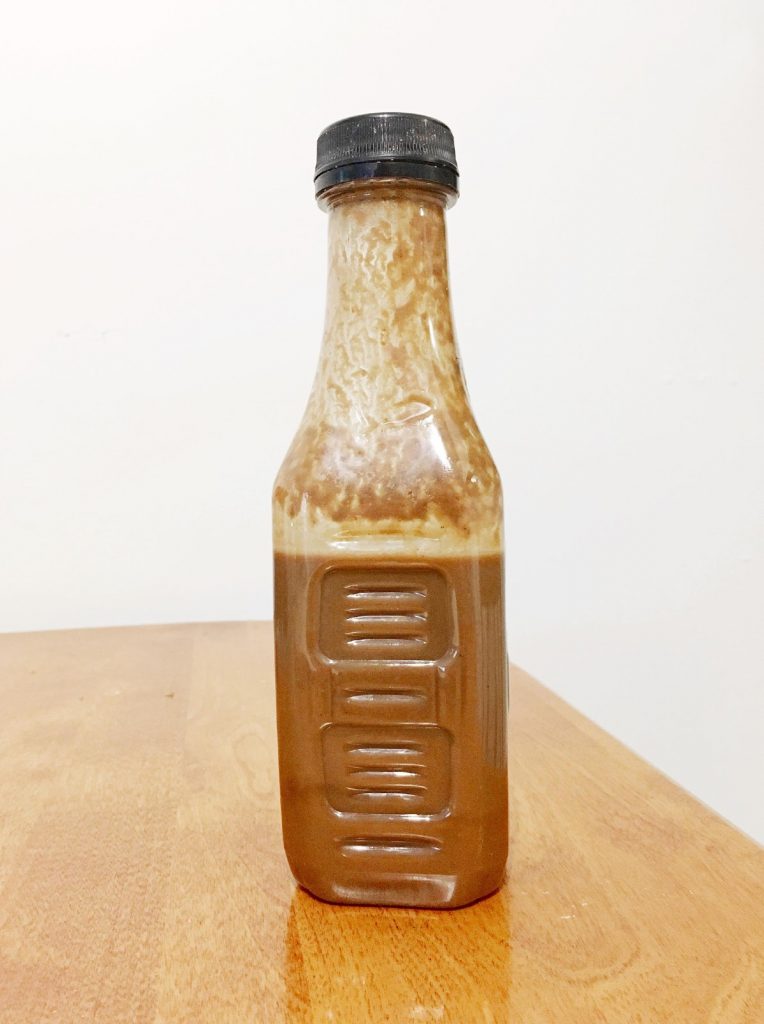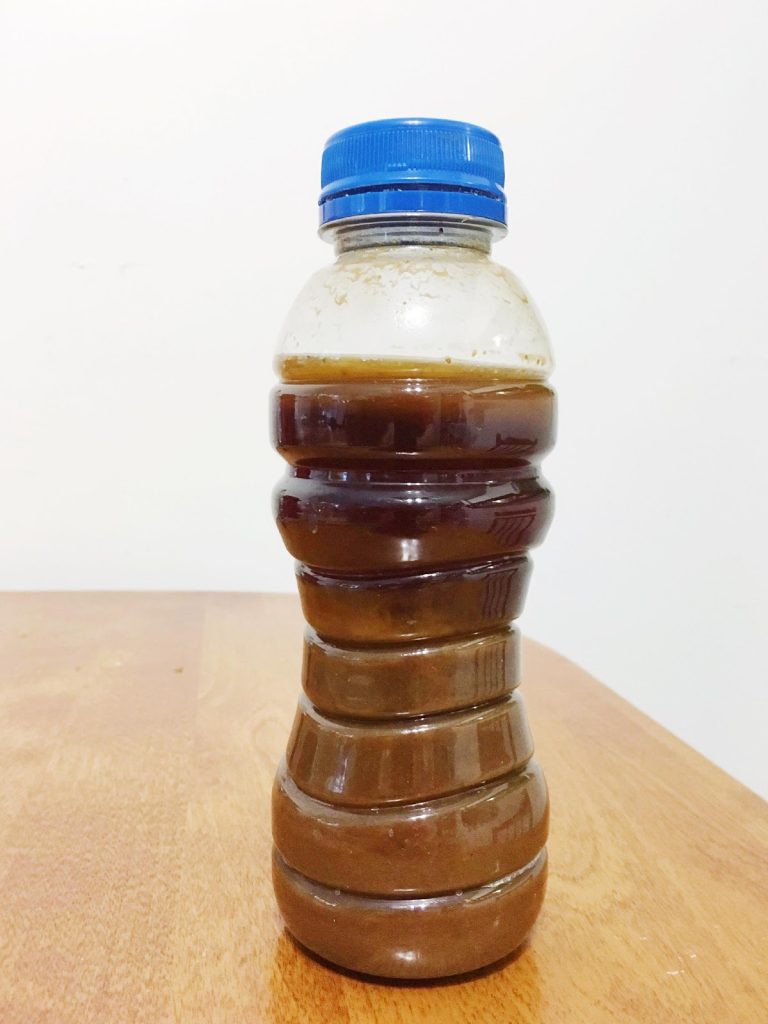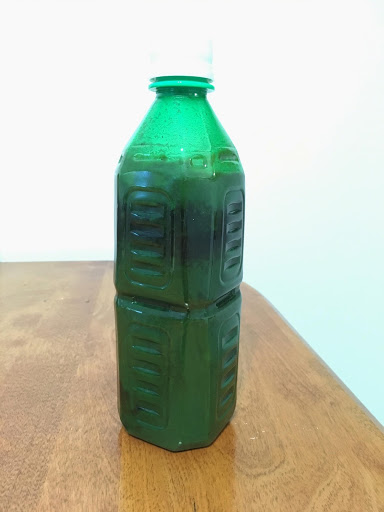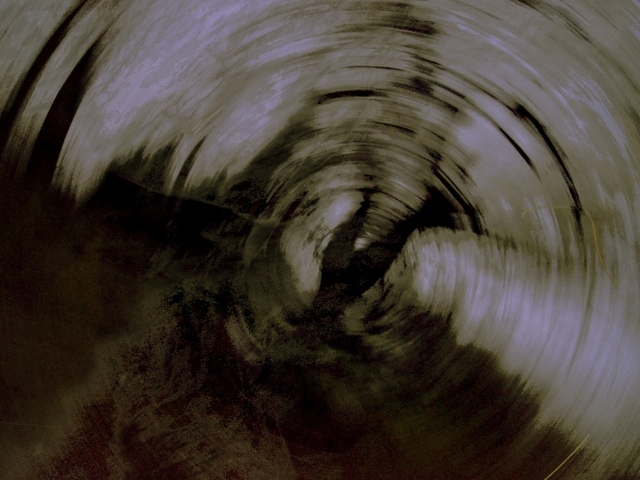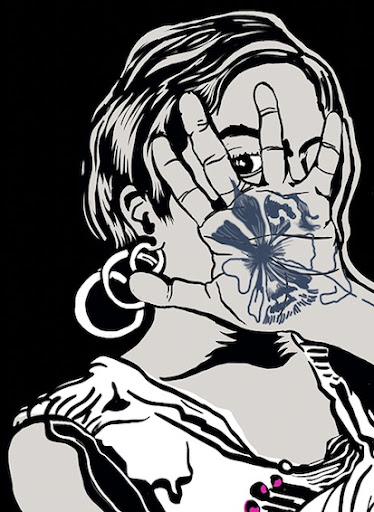I will outrun the smell of wet decay, your Mekong river in a Gatorade bottle.

October 26, 2018
Plastic 2: Nay Saysourinho’s flash fiction takes in the deeply entwined relationships between smell, memory, and motherhood; calling on that which keeps and refuses to (dis)integrate.
The countertranslation below features translations of Nay’s work by fellow contributors to this folio. By making visible the multiple languages hiding in a mouth, and promoting translations that destabilize notions of mastery, countertranslation hopes to open possibilities of exchange beyond the frames of English and nurture a wider community of interpretation.
FISH PASTE
Plastic bottles, in my childhood home, smelled like rotting seafood. Even without their labels, their shape revealed their former lives as containers of energy drinks, spaghetti sauce, vegetable oil. They told stories of weekly trips to discount grocery stores, of clipping coupons, of stocking up on cheap brands of over-processed food. Once emptied, the bottles would be filled with fish paste, its stench forever permeating the thin, clear plastic.
I think of it when I wander in the perfume section of a department store. The perfume bottles, with their vaporous colors and exquisite detail, are beautiful and impossible to reuse. They, too, contain the stench of animals. Of ambergris shed by whales and musk secreted by deer. The containers we decide to use, reuse, or throw away trace the arc of our socioeconomic aspirations. The word “aspirational” comes from Latin, aspirare. To breathe. Tell me what you breathe and I will tell you who you are.
The taste of your memories is tucked beneath your tongue, ready to inundate your mouth when you miss home. No, I tell my mother. I will forget the taste of rotten fish. I will outrun the smell of wet decay, your Mekong river in a Gatorade bottle. The first time I went to a boy’s house, I opened his cupboards and learned new colors. Virgin olive oil. Balsamic vinegar. Champagne vinaigrette. Subtlety in glass jars with crisp white labels. I read them like I read the taxonomies of exotic butterflies, where I learn about life’s possibilities. It is possible to not be me. It is possible to not be her.
I watch her tear the carp to pieces, watch her add the rice bran and the salt. The plastic lid is tightened and she smiles. Come back to me in a year, maybe three, she says. I know you were talking to the padaek, I tell her, but I want you to know I am never coming back. My mother says nothing but I think she cries in her bedroom sometimes.
I leave California because she never says sorry. In the airport, my father hands me twenty dollars in case I get hungry and asks me if I know why my mother named me after a river. I think of something clever but I am no match for her simplicity.
It is because of your grandmother.
She had ten children, as you know. When your grandmother died, she told your mother throw my ashes in the river so I can finally travel. All I’m saying is, drop your mom a call sometimes.
Sure, I said. Would you mind sending my things by mail? My Jules Verne books, my sweaters, a pot, a pan, a rice cooker, some Tupperware? In an apartment above a garage in Vermont, where I unpack the parcel he sent me, I notice the persimmons in a mesh bag in case I get hungry.
I marry a man when winter ends. Our wedding is private and tastes like burnt sugar spilled over snow. My husband smells like cedar trees and coffee and I have fallen for the cleanliness of his light blue eyes. Our counters are never sticky and our meals paired with wines that all taste the same, but they go well with the chicken breast that has been trimmed of its fat and skin and flavor. Could I get more salt? I ask the waiter at the restaurant near the university. And pepper? I think of my mother but I still do not call. I have not seen her in five years but if I saw her again, I would sniff her sleeve the way I did as a child.
My husband graduates and I find myself by the table where the food is laid out for guests. Stay away from the shrimp, he jokes, I don’t think it’s fresh. The seafood has a vivid whiff of the sea and I can see people wrinkle their nose, but I hope the waiters leave it alone for a while. It feels a little bit wrong but it feels like something I know. I am so lost in my thoughts that I forget to hiss when the doctor on the podium compares her jogging pains to the Trail of Tears. I used to go to school with girls like that. In my dreams, they still smell like Calvin Klein.
We will need to move to a bigger house, my husband says as he puts his framed degrees away. He has impeccable taste and his things are pristine. Our cupboards are filled with glass jars of jams and jellies and organic honey. I never get used to the tartness of rhubarb, even when it is sweetened with strawberries, yet I crave the sour slices of green mangoes dipped in a thick memory that eludes me. My belly is full of baby and my mouth full of water.
We empty the apartment together but I tire fast. I am eight months along and good for nothing. My hair is heavy with the dampness of July and I sink into the couch with my legs spread wide. Should we keep this, should we throw that, he asks and I nod through my haze, and I am almost asleep when he waves it at me. What the hell was in here, he complains. This plastic bottle smells like shit. I watch him throw it in the recycling bin and I close my eyes, thinking of all the times I tried to clean it. But you can’t outrun the Mekong river in a Gatorade bottle.
Sweetie, hey sweetie. Should we name our daughter after a river? Sometimes it is the only way out of a landlocked mother.
C O U N T E R T R A N S L A T I O N
FISH PASTE
The taste of your memories is tucked beneath your tongue, ready to inundate your mouth when you miss home. No, I tell my mother. I will forget the taste of rotten fish. I will outrun the smell of wet decay, your Mekong river in a Gatorade bottle. The first time I went to a boy’s house, I opened his cupboards and learned new colors. Virgin olive oil. Balsamic vinegar. Champagne vinaigrette. Subtlety in glass jars with crisp white labels. I read them like I read the taxonomies of exotic butterflies, where I learn about life’s possibilities. It is possible to not be me. It is possible to not be her.
Gia vị ký ức con rúc dưới lưỡi, sẵn sang để tràn ngập miệng lúc con nhớ nhà. Không, tôi nói với mẹ. Tôi sẽ quên đi mùi vị của cá ươn. Tôi sẽ chạy thoát hương vị ẩm ướt của sự mục nát, sông Cửu Long mẹ trong một chai Gatorade. Lần đầu tiên tôi đến nhà của một con trai, tôi mở tủ bếp cậu ta và học được những sắc màu mới. Dầu ô liu nguyên chất. Dấm balsamic. Sốt dấm rượu sâm banh. Lấp ló trong lọ thủy tinh với những nhãn hiệu trắng tinh. Tôi đọc chúng như đọc nguyên tắc phân loại bướm kỳ lạ, nơi tôi được học về các khả năng trong cuộc sống. Có thể tôi không phải là tôi. Có thể tôi không phải là mẹ.
I marry a man when winter ends. Our wedding is private and tastes like burnt sugar spilled over snow. My husband smells like cedar trees and coffee and I have fallen for the cleanliness of his light blue eyes. Our counters are never sticky and our meals paired with wines that all taste the same, but they go well with the chicken breast that has been trimmed of its fat and skin and flavor. Could I get more salt? I ask the waiter at the restaurant near the university. And pepper? I think of my mother but I still do not call. I have not seen her in five years but if I saw her again, I would sniff her sleeve the way I did as a child.
冬天过了以后我结婚了。我们的私人婚礼是烧焦的糖洒在雪上的味道。我的丈夫有雪松和咖啡的香味. 我爱上了他眼睛的干净的淡蓝色。我们厨房里的柜台永远不粘, 我们吃的饭都跟葡萄酒一起配。 每一瓶都有一样的味道, 但是它们跟没有皮没有味道的鸡胸肉搭配完美。在大学附近的餐馆我问服务员, “有没有更多的盐吗?我可以要一些胡椒粉吗?” 我想起来我的妈妈, 可是我还是不打电话。我五年没有见她但是我知道我一见她我会像小时候闻她的袖子。
‘Virgin’ is such a strange way to describe olive oil. While I considered the literal translation of ‘trinh’ (virgin, chaste, virtuous) in Vietnamese, there is no sense is chaste olive oil. My friend and I ended up going down to the kitchen cupboards to check the import labeling: ‘dầu ô liu nguyên chất’, ‘pure olive oil’.
一James Jack Huynh
Nay Saysourinho’s Fish Paste is a beautiful testament to the way that taste binds us to memory, family, and identity. How do we—or can we even—change the tastes we grow up with, and will they ever leave us—even if we want to escape them sometimes? I was especially drawn to the love story in this paragraph—the burnt sugar wedding, the new husband, new place with clean counters and wine pairings, and still at the core of it all, a deep longing for family and the familiar, for more salt, more flavor, just like home, despite the heartbreak that accompanies it.
I grew up speaking Chinese at home and went to weekend Chinese school for a while, but now that I’ve moved away and don’t use it very often, the language has faded. It floats in and out, as I overhear conversations in Mandarin. It sharpens when I have a craving for a food that I can only name in Chinese. The process of translating this paragraph into Chinese was an exciting challenge. Nay’s language is vivid, sensory, and artful and my Chinese is primarily conversational. I understand and speak somewhat fluently, but I rarely type or write in Chinese. I have a radical-based Chinese dictionary, but it takes me forever to figure out, so I mainly used google translate to confirm and correct what I initially translated in my head.
I had the computer sound out the translated Chinese so I could hear it. I used a pinyin Chinese keyboard, so there were instances where I had typed the wrong character, but didn’t catch my mistake until the computer read it out loud and it sounded wrong. The result is a very literal translation. I added some colloquial filler words like “吗” and “了” to make the translation sound more like the Chinese that I hear and speak. Terms like “cedar trees,” and “counters” were not in my Chinese vocabulary at all. I google image-d “柜台” which is what google translated for “counter” to see if it was correct. I called my dad, telling him about the translation asking him about “柜台.” The images showed counters, I insisted, but he told me that “柜台” refers specifically to shop counters rather than kitchen counters, and that there isn’t a direct Chinese translation of “kitchen counter.” There’s an island counter in my parent’s house, but I don’t remember calling it “柜台”。I do remember that it was sometimes sticky.
一Karen G

